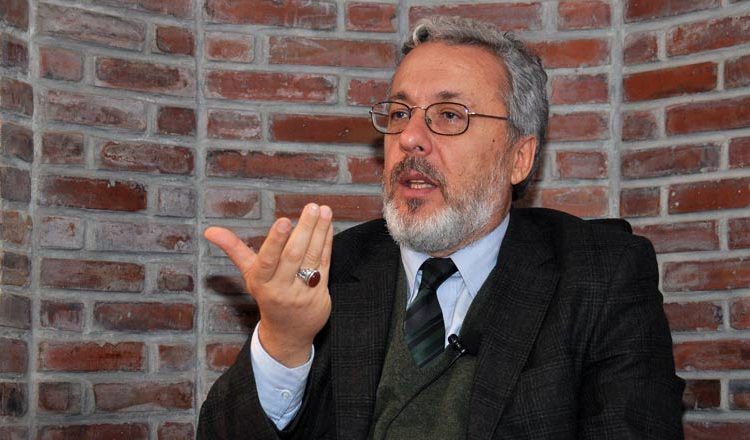Nordic Monitor
Under Recep Tayyip Erdoğan’s tenure, first as prime minister and now as president, Iran has become more visible in Turkey’s state apparatus, with pro-Iranian figures including Islamist and neo-nationalist (ulusalcı) officials named to critical positions in the Turkish Foreign Ministry.
In August 2019 President Erdoğan appointed a pro-Iranian theology professor, Mahmud Erol Kılıç, who had written a regular column for the Yeni Safak daily until September 2018, a mouthpiece for the Erdoğan regime, as Turkey’s ambassador to Indonesia. Kılıç officially assumed his new diplomatic duties on August 7, 2019.
When Erdoğan visited Tehran in 2014, he said, “Iran feels like a second home,” a statement that sums up the president’s affection for the Islamist regime in Iran. A pillar of Erdoğan’s anti-Western policies, Dogu Perinçek, leader of the neo-nationalist Homeland Party (Vatan Partisi in Turkish, VP) is a staunch supporter of Iran. He claimed that “a strong Iran means a strong Turkey” and called Iran “one of the most powerful bastions fighting against American imperialism and Israel in western Asia.” Following the formation of the alliance with Erdoğan, Perinçek’s influence in major sectors of Turkey from the bureaucracy to the judicial system and from state administration to the military and media started to rise.

In his columns published in Yeni Safak, Kılıç regularly praised the Iranian regime and its foreign policy while revealing his anti-Arab and anti-Semitic views. “The Arab world has identified Arab consciousness with the Salafi religious interpretation. … Today, unfortunately, Salafism has frozen the brain of the Arab Muslim world. It is difficult to find a non-Salafi Muslim philosopher in the Arab world. Shiism, which reached its peak through their eternal enemies the Persians, is winning victories against Salafism. People in many places, primarily Africa, are joining Shiism,” Kılıç stated in an opinion piece published on November 19, 2017
“They [Arabs] should stop humiliating non-Arabs like us so that they can benefit from our experiences. We are ready to teach them the tradition that they lost. … However, if they make friends with the British Lawrence, American Trump, Israeli Netanyahu instead of me, I advise them to read the ‘those who take to themselves peers other than Allah’ leaflets,” he said.

In another piece Kılıç argued that Iran would be attacked by the “Wahhabi-Zionist-Evangelical brotherhood” due to its stance against Israel. According to Ambassador Kılıç, Iran should be protected by another “brotherhood alliance” since the Iranian regime rejects the existence of Israel and defines the country as the “Zionist invader regime.” He repeatedly accused Saudi Arabia and other Arab countries of supporting radical groups in Afghanistan, Pakistan and Somalia.
He also benefited from anti-Western narratives and conspiracy theories to disseminate his arguments. “This week, I participated in a meeting, held in Rome, on the Middle East policies of the NATO Parliamentary Assembly. At the meeting, the representative from the Netherlands underlined that ‘Islam and the entire Quran are problematic. Bosnia and Herzegovina and Albania should not [be allowed to] join us.’ … The meeting was attended by military and intelligence personnel rather than political experts,” he argued in an article published on November 27, 2017.
According to Kılıç, Iran, Qatar and the Erdoğan government have challenged Israel in recent years. In response, Israel and its allies planned to invade Iran, imposed an embargo on Qatar and carried out a coup attempt to oust President Erdoğan.

Kılıç served as secretary-general of the Parliamentary Union of the OIC Member States (PUIC) between 2008-2018. The PUOIC was founded in 1999 and is based in Tehran.
In April 2018 he said in an interview with Gerçek Hayat, an Islamist magazine owned by Yeni Safak, that Erdoğan insisted on his candidacy for the position despite resistance from Turkey’s 11th president, Abdullah Gül, the then-OIC Secretary General Ekmeleddin İhsanoğlu and the Turkish Foreign Ministry.

Turks have been alarmed for years by the increasing presence of Islamists, including some with alleged ties to the Iranian regime, in critical positions of power in Ankara. In the most notorious case, Hakan Fidan, Erdoğan’s close confidant with well-established pro-Iranian sympathies, became the head of Turkey’s National Intelligence Organization (MIT) in 2010. Interestingly, the state bureaucracy developed closer ties with Iran after a failed coup in Turkey in July 2016.
More than 130,000 public officials including soldiers, judges, teachers, police officers and diplomats have been dismissed by the government with no effective judicial or administrative investigation in the aftermath of the coup attempt. While the Turkish Foreign Ministry dismissed its qualified career diplomats, several pro-Iranian figures have been offered ambassadorial posts.
Moreover, almost all pro-NATO officers were purged from NATO’s second largest army and replaced by pro-Iranian, neo-nationalist or Islamist officers following the coup attempt, which many believe was a false flag operation orchestrated by President Erdoğan, Fidan and then-Chief of General Staff Gen. Hulusi Akar. Some experts claim that Iranian intelligence was informed of these preparations by its loyal asset in Turkey, Fidan.
The massive purge of pro-NATO elements from military positions in the wake of the failed coup was a welcome development from Iran’s perspective. In August 2017 the then-spokesperson of the Iranian foreign ministry, Bahram Qassemi, stated that the abortive putsch had facilitated the beginning of a détente in bilateral relations between Ankara and Tehran, saying: “Iran’s support for Turkey following the coup attempt brought a new season in bilateral relations. … We conveyed that Iran was ready to meet any requests from Turkey.”












